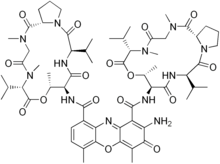
A group of researchers has shown for the first time in cells and in a mouse model that a drug used to treat cancer can neutralize the toxic RNA that causes the prolonged muscle contractions and other symptoms of myotonic dystrophy type 1, the most common form of adult-onset muscular dystrophy. The researchers report their findings today Dec. 10, 2015 in the journal Cell Reports. (actinomycin-D)
"This finding opens a new avenue for a therapeutic strategy for this disease," said Andrew Berglund, Ph.D., a professor of biochemistry and molecular biology in the University of Florida College of Medicine. "This is the first evidence that specifically inhibiting transcription can be effective in knocking down the toxic material that causes the disease."
In myotonic dystrophy and other related neurological disorders, the symptoms stem from repeated individual nucleotides, or "building blocks," in the RNA in muscle tissue cells that can build up over time. These repeats, called CTG expansions in myotonic dystrophy type 1, become 'toxic' when transcribed from DNA. The expansions disrupt the RNA binding proteins responsible for splicing, the 'editing' needed so that the RNA can create appropriate proteins that allow muscles to function properly.
